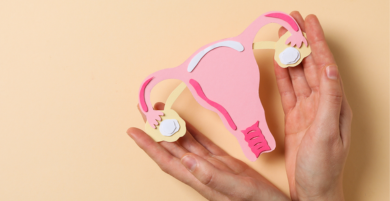Menstruation, also known as ‘having a period’, is a completely natural process that happens to people with uteruses. It usually starts when a person is in their early teens and continues throughout their reproductive years. Despite being so common, there are often a lot of questions and misunderstandings about periods. In this guide, we'll tackle some of the most common questions about menstruation, clearing up any confusion and setting the record straight.
What Is Menstruation?
Menstruation, commonly referred to as a period, is a monthly shedding of the lining of the uterus - known as the endometrium, along with blood and tissue through the vagina.
Typically lasting around 28 days, the menstrual cycle can vary from person to person.
During the menstrual cycle, hormonal changes in the body trigger the thickening of the uterine lining in preparation for a potential pregnancy. If pregnancy does not occur, the lining is shed during menstruation.
The lifecycle of menstruation covers a majority of a woman’s lifetime, beginning during puberty and continuing until menopause. Menstrual cycles can be influenced by various factors such as stress, diet, exercise, and underlying health conditions.
When Does Menstruation Begin?
For most people, menstruation starts during puberty, which can be as early as 8 years of age or as late as 16 years of age. But it can vary from person to person and might be affected by factors such as genetics, weight, and overall health.
What Causes The First Menstruation?
The first occurrence of menstruation, known as menarche, typically happens during puberty as a result of hormonal changes in the body. Several factors contribute to the onset of menstruation:
-
Hormonal Changes
During puberty, the body undergoes significant hormonal changes, including increased production of estrogen and progesterone. These hormones stimulate the development of secondary sexual characteristics and the maturation of the reproductive system, including the uterus and ovaries. -
Maturation Of The Reproductive System
As the reproductive organs mature, the ovaries begin to release eggs (ovulation), and the uterus develops a thicker lining (endometrium) in preparation for potential pregnancy. -
Hormonal Signalling
The hypothalamus, a region of the brain, begins to release gonadotropin-releasing hormone (GnRH), which stimulates the pituitary gland to produce follicle-stimulating hormone (FSH) and luteinizing hormone (LH), playing a crucial role in the regulation of ovulation and the menstrual cycle. -
Menstrual Cycle Initiation
Once the hormonal signalling reaches a certain threshold and the reproductive organs have sufficiently matured, the menstrual cycle begins. The first menstrual period typically occurs around two to three years after the onset of breast development (thelarche) and other signs of puberty.
It's important to note that the exact timing of menarche can vary widely among individuals and may be influenced by factors such as genetics, nutritional status, body weight, and overall health.
How Long Does A Period Last?
A typical period lasts for around 3 to 7 days, but it can be different for everyone. Usually, the first few days are the heaviest, and then the flow gets lighter as the period goes on.
What Are Common Symptoms Of Menstruation?
Common symptoms of menstruation, also known as PMS (premenstrual syndrome), include cramps in the stomach, bloating, tenderness in the breasts, mood swings, fatigue, headaches and other symptoms. These symptoms can vary a lot from person to person and might start a few days before the period begins.
Is Menstruation Painful?
Some people might feel mild discomfort during menstruation, while others might experience more intense pain, called dysmenorrhea. This pain can make it hard to do regular activities and might need medical help to manage.
Can You Get Pregnant During Menstruation?
Getting pregnant during menstruation is less likely, but it's still possible, especially if your menstrual cycle is short or irregular. Sperm can live in the female body for a few days, so if you ovulate shortly after your period ends, you could still get pregnant.
How Do You Manage Menstruation?
There are lots of ways to manage menstruation, like using pads, tampons, menstrual cups, or period underwear. It's also important to keep good hygiene, drink enough water, and get plenty of rest to help ease any symptoms you might have.
Are There Any Health Risks Associated With Menstruation?
For most people, menstruation is a normal and healthy process. But sometimes, things like heavy bleeding, irregular periods, or really bad cramps can be signs of other health issues. It's a good idea to talk to a doctor if you have any concerns.
Can Menstruation Affect Your Daily Life?
Menstruation can sometimes make it harder to do your usual activities, especially if you have bad symptoms. But with the right care and habits, most people can still go about their day as usual without too much trouble.
Conclusion
Understanding periods is important for everyone. They're a normal part of our bodies, and there's nothing to feel embarrassed about. By learning about menstruation and talking openly about it, we can feel more confident and comfortable. Remember, periods are just a natural process. Let's create a culture where periods are openly discussed and support is readily available. Together, we can make menstruation a natural and celebrated part of life.










